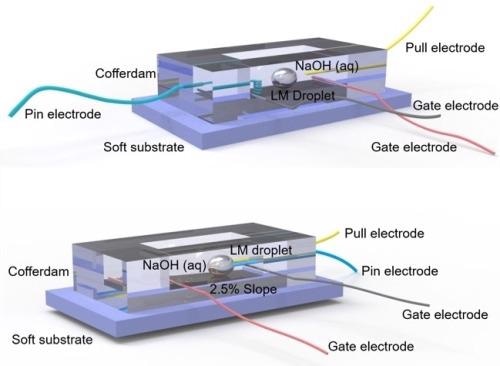Mar 29 2021
Soft robots offer various benefits such as different movement patterns, and friendly interaction with humans, flexible actuating tactics.
 Structural principles of liquid metal droplet electronic devices. Image Credit: Jing Liu et al.
Structural principles of liquid metal droplet electronic devices. Image Credit: Jing Liu et al.
However, the fabrication of a completely integrated flexible robot is still extremely difficult because of the lack of appropriate practical methods and soft controllers.
Led by Prof. Jing Liu from the Technical Institute of Physics and Chemistry (TIPC) of the Chinese Academy of Sciences, a team of researchers used the locomotion and deformation behavior of liquid metals (LMs) through the electrical stimulus to propose and demonstrate a new kind of liquid metal droplet electronic device.
The device could be further arranged into gate logics to perform logical computing.
Published on March 18th, 2021, in Advanced Intelligent Systems, the study demonstrated, for the first time, the significance of liquid metals in intelligent electronic control systems. It also offers a new technique to develop soft electronic devices.
As a new class of smart materials, liquid metal is inherently flexible, electrically conductive and responsive to stimuli. It is highly possible to develop soft intelligent electronic devices and explore the potential application of LMs in control systems.
Jing Liu, Professor, Technical Institute of Physics and Chemistry, Chinese Academy of Sciences
The new device helps eliminate the dependence on semiconductors by directly developing electronic devices on soft materials to carry out logical calculations and operations.
A range of logic gates can be simply developed through various connections to liquid metal droplet electronic devices, which have exhibited stable functionality for binary logic calculation.
The researchers demonstrated the feasibility of application by building a soft four-degree logic accumulator through a liquid metal droplet electronic device, which could manipulate a pneumatic soft gripper within four states of inflation.
The spatial scale of liquid metal-involved motion is very small as it lacks any bulky ancillary equipment and can be easily miniaturized and integrated.
The trial of logic devices based on liquid metals, in this study, showed that electrically induced variations of liquid in a macroscale could be potentially designed as processors to receive, convert, and export electrical signals.
Thanks to the natural compatibility with such devices and soft structures, they may find potential applications to achieve the ultimate autonomy and manipulations of soft robots in the near future.
Journal Reference:
Li, D.-D., et al. (2021) Liquid Metal‐Enabled Soft Logic Devices. Advanced Intelligent Systems. doi.org/10.1002/aisy.202000246.